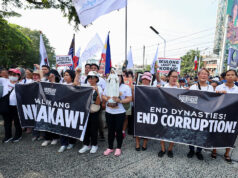Economic managers tout infrastructure, reform gains to US businessmen
STATE economic managers flew to Washington D.C. last week to showcase the country’s infrastructure developments and economic reforms, in efforts to woo more foreign firms to invest in the Philippines.
Led by Finance Secretary Carlos G. Dominguez III and Bangko Sentral ng Pilipinas (BSP) Governor Benjamin E. Diokno, key economic officials made the case before 150 executives from top US banking, investment and financial firms at the Philippine Day Forum held on April 11, the government’s Investor Relations Office said in a press release on Wednesday.
At the forum, Mr. Dominguez said that while the Philippines ranks as among the best performing economies in Asia, mere economic growth is not the final goal of all the government’s efforts.
“We seek a more dynamic and competitive economy to bring down poverty rates and create more opportunities for our people,” he said at the conference held at the sidelines of the spring meetings of the International Monetary Fund and the World Bank.
The Philippine Statistics Authority earlier this month said less Filipinos were mired on poverty in the the first half of 2018. During that period, poverty incidence — the proportion of Filipinos whose incomes fell below the per capita poverty threshold of P10,481 per month — fell to 21% from 27.6% recorded in the first half of 2015.
World Bank Vice-President for East Asia and Pacific Victoria Kwakwa said the country has the “potential to become the next East Asian success story.”
“Its vision to become a prosperous, resilient, middle-class society free of poverty by 2040 is an achievable goal — but one that will require continued reform and investment to open the economy, overcome infrastructure backlog, invest in human capital, and build the resilience of the nation, especially as the threat of climate change increases,” Ms. Kwakwa said in her opening remarks.
The state embarked on an P8-trillion “Build, Build, Build” infrastructure program in an effort to boost economic growth to 7-8% until 2022 from a 6.3% average in 2010-2016. But the first two years of the current administration saw gross domestic product (GDP) growth average 6.45%, and economic managers last month slashed the official GDP growth goal this year to 6-7% from 7-8% due to delayed enactment — just last Tuesday — of the 2019 national budget that left new projects unfunded.
“We are determined to deliver what we say, and to deliver them on time and on budget. All of these infrastructure projects have made the Philippines one of the most attractive destinations of the world,” said Vivencio B. Dizon, president and chief executive officer of Bases Conversion and Development Authority.
The government is pushing for comprehensive tax reform to simplify the regime and generate more revenue to support its infrastructure program and expand social services.
Finance Assistant Secretary Antonio Joselito G. Lambino III said that this is the first time the country overhauled tax system to reduce poverty and inequality and not for deficit or debt reduction.
Signed into law in December 2017, Republic Act No. 10963 or the Tax Reform for Acceleration and Inclusion Act — the first of up to five packages — slashed personal income tax rates in order to put more money in households’ pockets but increased or added levies of various goods and services and removed several value added tax exemptions.
The government is also set to implement RA 11213 or the Tax Amnesty Act, enacted on Feb. 14, that will net more tax delinquents into the fold.
However, Senate President Vicente C. Sotto previously mentioned that it was “doubtful at this point” that the Senate could approve any more tax reforms — which have secured lower house approval — in the remaining May 20-June 7 session days of the 17th Congress. Tax reforms approved by the House of Representatives but still awaiting fiat in the Senate Ways and Means committee entail bills to reduce corporate income tax rates and remove redundant fiscal incentives, simplify the tax structure of the financial sector, centralize real property valuation and assessment; increase government share in mining revenues and even higher excise tax rates for alcohol and tobacco products.
BSP’s Mr. Diokno meanwhile underscored the resilience of the domestic economy to external headwinds, as well as the capacity to sustain robust economic growth. “For the Central Bank, it is a matter of careful commitment and timely action. The economy itself is fundamentally solid. Overall macro-economic conditions provide sound basis for cautious optimism,” he said.
On the sidelines of the event, the central bank chief told Bloomberg Television that a cut in benchmark interest rates will be considered on May 9, when the BSP holds its third policy review for this year. — K. A. N. Vidal



